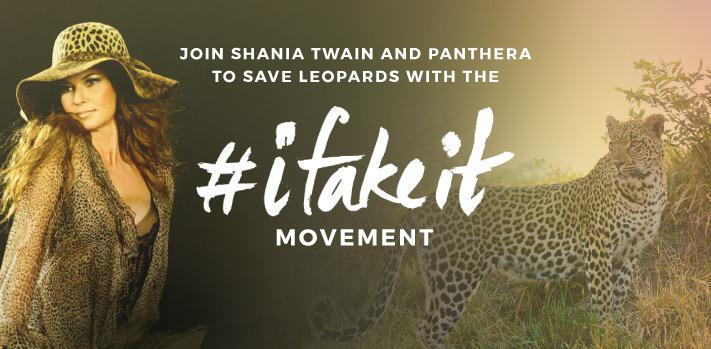International superstar Shania Twain and Panthera, a global wild cat conservation organization, have launched #IFAKEIT – a social media campaign to raise awareness for one of fashion’s most revered but underrepresented icons – the leopard.
Referred to as the ‘new neutral,’ this cat’s spotted print has inspired fashion for centuries, influencing style from catwalks to sidewalks, celebrities and even first ladies. The purpose of this campaign is to connect the dots, and inform the general public that while the spots they are wearing are so widespread, the real leopard is under serious threat.
Every year, more leopards are killed in the wild than any other big cat. The species has vanished from nearly 40% of its range in Africa and over 50% in Asia. And it is their beauty that is partly responsible. While leopards are also in jeopardy from loss of habitat and conflict with people, the demand for their skins is one of the main causes of their decline.
Even though the international trade in leopard skin is now illegal, it is still common for local communities in Africa and Asia to use real leopard skins for religious and cultural ceremonies, whether worn as capes or used for other traditional regalia.
Panthera’s Furs for Life Leopard Project is providing a simple and sustainable solution that protects leopards but also supports local culture. Collaborating with digital designers, Panthera has created a high-quality and realistic faux leopard skin to replace the authentic skins worn at ceremonies.More than 5,000 faux leopard capes have already been donated in southern Africa, and Panthera’s new partnership with the Peace Parks Foundation and Cartier has enabled the distribution of at least another 13,000 more capes before the end of 2017 (Read the press release about this partnership here.)
“I was shocked to learn that these gorgeous animals are being killed for their beautiful skins and other parts for the illegal trade, and yet are so loved by the fashion world. We wanted to capitalize on the fact that people everywhere are wearing more leopard print than ever, but so few know what’s actually happening to them in the wild,” said Shania Twain, Panthera’s Leopard Ambassador. “With Panthera, we aim to begin this conversation and generate awareness for leopards on a grand scale, while giving people something tangible to grasp, and engage in a fun and impactful way.”
To do this, Shania Twain and Panthera have launched the #IFAKEIT campaign and are asking people around the globe to join the movement and show how they ‘fake it’ for leopards by posting photos of themselves wearing fake leopard print to Twitter, Instagram and Facebook with the #IFAKEIT tag. People can also donate to the campaign at ifakeit.org, where just $30 can support the creation of one fake leopard skin and save a leopard’s life.
The campaign first aims to generate 18,000 unique mentions tagged with #IFAKEIT on social media, to accompany each donated cape, as a thank you to the communities willing to fake it and to stop leopards from being killed for their skins. The campaign also aims to raise $300,000 for the creation of at least 5,000 new fake leopard skins to distribute to communities outside of southern Africa, and to support other conservation activities to protect leopards across their range.
Lizwi Ncwane, an elder and legal adviser of the Nazareth Baptist ‘Shembe’ Church, stated, “As a leader of the Shembe community, I have seen firsthand how receptive my community is to using these fake skins. Not only do they look and feel like real leopard skins, they also last longer. We’re grateful that Panthera has worked with us in finding a solution that interweaves the conservation of leopards with the customs of the Shembe.”
Panthera’s Leopard Program Director, Dr. Guy Balme, explained, “Panthera’s Furs for Life Leopard Project is providing an innovative and real solution to a threat that is decimating leopard populations. Very rarely in the world of conservation do you see a resolution this simple and respectful of cultural and religious traditions that is so swiftly accepted by local communities.”
Dr. Balme continued, “In just a few years, we have seen a positive and deeply-rooted cultural shift in the adoption of Panthera’s fake leopard skins in southern Africa. We hope the #IFAKEIT campaign will help bring much-needed attention to the plight of leopards and help spark a movement that ensures the species, and not just the images of their beauty, remain long into the future.”
Visit ifakeit.org to learn how to ‘Show Your Spots, So You Can Save Theirs.’







